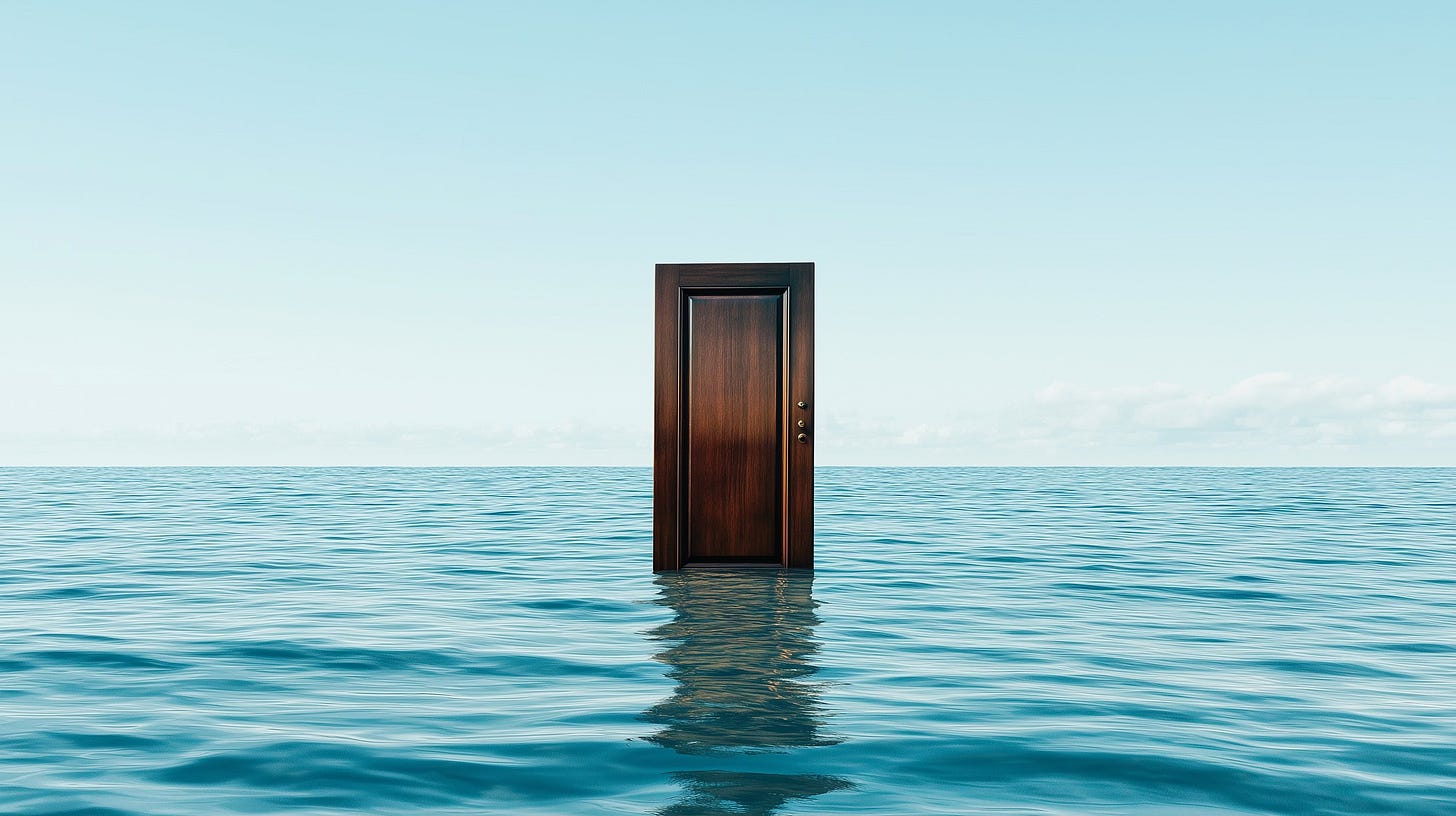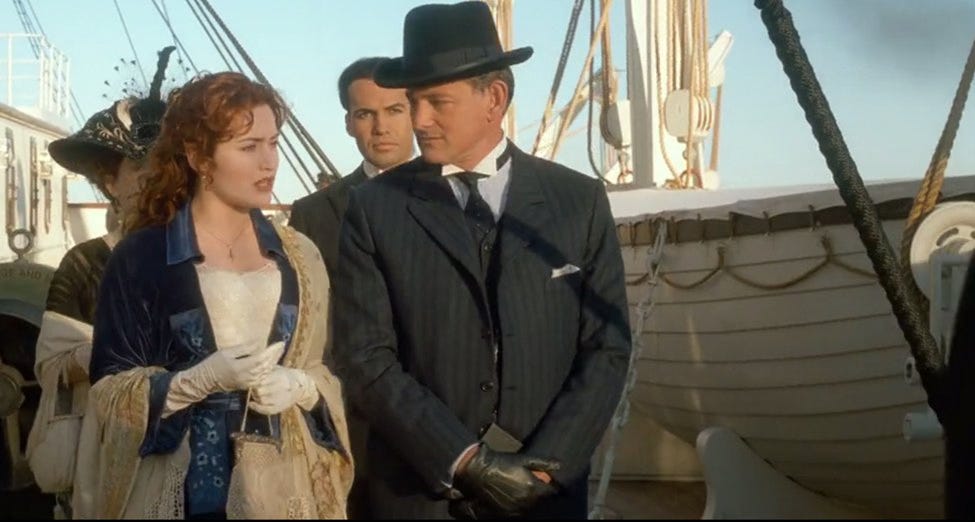A.I. Saved Me From Drowning
On Titanic, and other sinking ships.
There’s a scene in Titanic where Rose strolls the upper deck of the ship with Mr. Andrews (a woefully charming and sincere naval architect played by Victor Garber).
Moments before, the Captain receives another iceberg warning. All too quickly, the threat is dismissed and leisure continues as usual. Ladies and gentlefolk peer out across the sunny, blue horizon while children play and Jack Dawson/Leonardo DiCaprio continues to secure his crown as heartthrob of the decade.
Concerned and intelligent beyond her first class peers, Rose runs the “calculations” in her head.
There aren’t enough lifeboats.
Of course, narratively, James Cameron is just foreshadowing the tragedy we all know to be inevitable.
Mr. Andrews turns to her and says, “Rose, you miss nothing, do you?” He admits that she’s correct. In fact, there are barely half enough lifeboats for everyone on board.
But rest assured, the Titanic would never, ever sink.
Just like how Hollywood would never, ever collapse.
In the summer of 2023, I walked the perimeter of Paramount and Warner Bros studios with my writer and actor friends. The WGA and SAG strikes had brought our work to a halt. Projects we’d all worked hard to push through in spite of the pandemic, in spite of impossibly high rent, in spite of enduring years of minimum wage working as assistants (dressing “business casual” for agents and executives who wouldn’t care if we lived or died) and in spite of the already noticeable industry-wide recession, were put indefinitely on hold.
A general sense of rage towards institutional greed hovered above our handmade signs. In reality, it was all much deeper than that — our political, social and cultural anxieties bled through onto the picket line — but we’ll remember it as a passionate plea for better contracts.
And by far the biggest, hottest and most terrifying subject of the summer was artificial intelligence.
I listened as everyone around me denounced the evil technology, how it was going to take all our jobs, how robots could never replace human creativity, how the large language models suck at writing, and how using it makes you complicit in Elon Musk’s hellish tech bro oligarchy.
Still, I had an itch to move towards AI, not away from it.
On one hand, I agreed with my friends: AI doesn’t stand a chance against the creative essence of our human experience. It can’t replace the kernel of soul that flows through our stories, our art. But I saw how quickly it would swallow countless other roles and irreparably seam rip the production pipeline, no matter how forcefully we resisted it. The disruption would feel like enduring a natural disaster. It was time to find a lifeboat.
The iceberg had hit, the ship’s hull was flooding with water, and as hard we all tried to contain it, the unsinkable industry became sinkable.
As I squinted my eyes under the sweltering sun that summer, I had a creeping feeling that whenever and however we were all going to get out of this mess, there just wouldn’t be enough jobs for everyone — at least for some period of time. After all, replacing human labor with automation has been the goal of any for-profit business since the Industrial Revolution. And as much as we like to defend Hollywood as a blossoming epicenter of creativity, it’s ultimately a capitalistic endeavor, too.
Too ironically, I realized, the strikes would give these studios the time and space they needed to figure out exactly how to replace us with AI.
And to some degree, they have.
Things never really bounced back, and even the WGA’s so-called “wins” left more writers unemployed than ever. Beneficiaries of much-needed diversity programs couldn’t land a second or third writing job. US-based production dropped 40% after the strike. Regardless, have there been inspiring, miraculous, wonderful, independent films produced in the last few years? Totally. But not nearly enough to carry us all.
With nothing to lose that summer, I took a peek behind the AI curtain. At the time, the best AI videos were viral Wes Anderson Star Wars and Lord of the Rings parodies. I didn’t realize it then but just a year later, the creator of those videos would become my boss, friend and collaborator at Curious Refuge. If you wanted to hate on AI, it was pretty easy. The images back then had a smoothed-over, creepy feeling. The human faces were off (and some are still uncanny). It seemed preposterous to think it would ever get good enough to mimic real life. But it’s already good enough for animatics, short-form social media content, commercials, teaser trailers, pitch decks, and storyboards, and it will only get better.
Still, I have never been more hopeful for the future of innovative filmmaking, in particular guerrilla-style, original indie films. I predict we’ll see emerging creators using camcorders and embracing a return to 70 mm. Physical media is already a new luxury and the over-saturation we’re about to see with AI will only accelerate it. As Charlie Fink said in Forbes this morning, “This is the dawn of a new Hollywood. What a spectacular opportunity for talented and ambitious young people.”
The hardest lesson I’ve learned over the last two years (whether it has to do with a job, a dysfunctional relationship or a crumbling industry) is to recognize when it’s time to let go. Clinging to the idea of 20-person writer’s rooms doesn’t serve us. Clinging to the idea of a booming TV industry where money falls from the sky doesn’t serve us. Relying on studios, or anyone in power, to “do the right thing” doesn’t serve us. For now, AI tools put filmmaking resources directly in the palms of creators, without the traditional gatekeeping reserved for major productions. If you don’t believe me, see what folks on Escape.ai are making.
By the end of 2024 I grabbed a floating door, blew a whistle, and found myself lopped aboard a tiny lifeboat with a handful of people inspired enough to keep going, and wise enough to let go.
As we drift away from the snapped-in-half Titanic, I do have to wonder: where is the lifeboat going?
I don’t know. But one thing’s for sure.
You’re not going to find me at the bottom of the ocean.




Titanic" is my all-time fave
Well said! The titanic metaphor is so apt. I remember one show I was on had 6 assistants in the writers room, all between 28-35, all waiting for a job that wasn't open up. They just kept cramming more people into a room with no space.